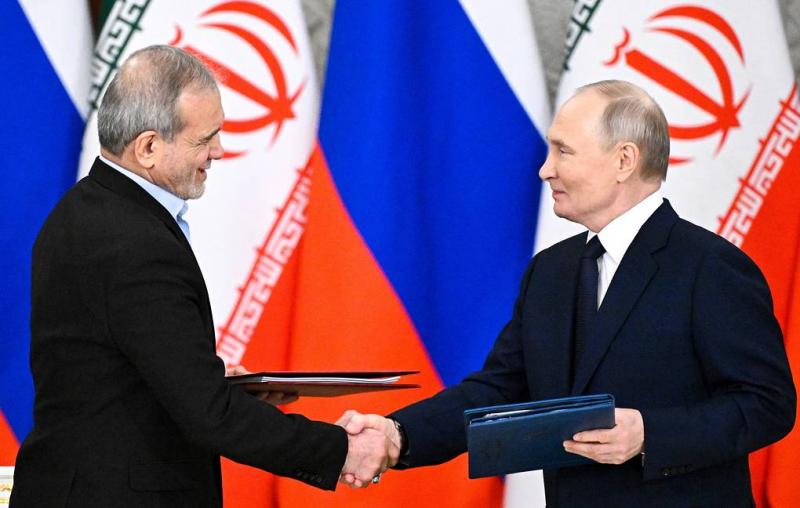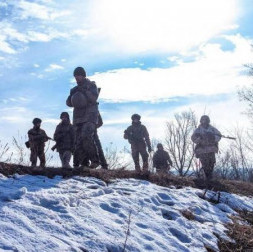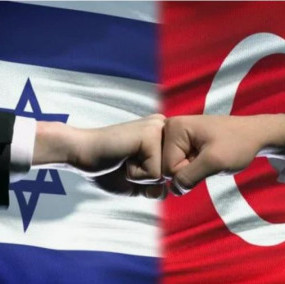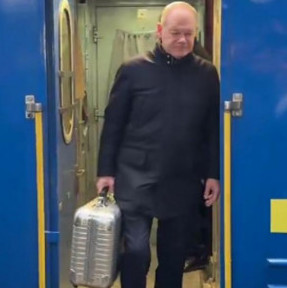
The Gaza ceasefire could prove fleeting, the Iranian president’s visit to Moscow unsettles the West, and Donald Trump is expected to visit China in the near future. These stories topped the headlines in Monday’s newspapers across Russia.
Media: How long will Gaza's ceasefire hold?
An agreement on a ceasefire in the Gaza Strip and the release of hostages came into force on January 19. The Gaza-based Palestinian radical organization Hamas told Izvestia that the deal was made possible due to US President-elect Donald Trump. As part of the agreement, the Palestinian group has already freed three hostages in exchange for 90 Palestinian prisoners detained in Israeli jails. Meanwhile, Israeli government officials are resigning in protest of the war’s suspension.
Palestinian security analyst Mohammed Al-Masri told Izvestia that the deal includes US guarantees to Hamas and other Palestinian factions that their leadership will not be targeted. Over 200 trucks carrying humanitarian aid have already crossed into the war-torn enclave via the border with Egypt.
According to Egyptian analyst Ashraf Sanger, two million Palestinians in Gaza are suffering from illness and starvation. He emphasized the urgency of delivering aid immediately to avert further catastrophe. The analyst informed Izvestia that hospitals are prepared to admit significant numbers of Palestinians.
The ceasefire in Gaza is unlikely to hold for long, and combat in the enclave could resume after its initial stage, Andrey Zeltyn, senior lecturer at the School of Asian Studies at the Higher School of Economics (HSE University), told Vedomosti. He explained that Hamas delayed submitting the names of the three hostages because of the need to precisely determine their whereabouts: some captives are held in underground tunnels, while others are housed with Palestinian families. "Locating them requires time. The conditions of the deal are inherently fragile, and implementing subsequent stages will be challenging for both parties. Therefore, if Hamas fails to locate 33 Israeli captives during the first phase, the Israeli army might use this as a pretext to restart hostilities," the expert stated.
The resignation of Israeli Minister of National Security Itamar Ben-Gvir and other cabinet members does not imply that Israeli Prime Minister Benjamin Netanyahu’s coalition has disintegrated, Zeltyn noted. He said right-wing politicians have merely announced their departure from the government, not the coalition.
Despite criticism of the Likud party, it could bolster its popularity by leveraging the release of Israeli hostages and securing support from the incoming US administration. This, according to the expert, might improve its chances in the 2026 elections.
Nezavisimaya Gazeta: Iranian president’s Moscow visit raises concerns among Tehran's rivals
The administration of US President-elect Donald Trump must take countermeasures against the signing of the Russia-Iran comprehensive agreement, Washington stated, commenting on the recent visit of Iranian President Masoud Pezeshkian to Moscow. Experts noted that this agreement cements nearly a decade’s worth of progress in Russian-Iranian relations. Additionally, Israel, Iran’s primary adversary in the Middle East, is expected to react negatively to this development.
Grigory Lukyanov, a researcher at the Center for Arab and Islamic Studies at the Institute of Oriental Studies under the Russian Academy of Sciences, told the newspaper that the comprehensive strategic partnership agreement was long overdue. However, he emphasized that it consolidates numerous accomplishments achieved since Russia’s military intervention in Syria in 2015 and the start of the special military operation in 2022. "At the same time, it’s worth highlighting that Iran’s expertise in navigating sanctions, accumulated during years of confrontation with the US, has largely been utilized. Russia, having studied this, can now offer its own strategies for overcoming sanctions," he explained.
According to the expert, Iran plays a critical role for Russia in advancing the major North-South geopolitical project. "Iran is essential for bolstering the infrastructure component of Russia's ‘pivot to the East’ and for diversifying trade routes after western cargo traffic channels were nearly severed. These objectives need to be formalized through long-term agreements," he emphasized.
Lukyanov added that the agreement will likely be seen by Israel as an unfriendly act and a demonstration of support for its rival. "The signing of this agreement could complicate efforts to normalize relations between Russia and Israel, which previously held promising prospects following the conclusion of the Bashar Assad regime," the expert concluded.
Vedomosti: Trump intends to visit China within 100 days of taking office
US President-elect Donald Trump, set to assume office on January 20, is reportedly planning a trip to China within 100 days of his inauguration, the Wall Street Journal (WSJ) reported, citing sources close to the US leader. These sources indicated that Trump aims to strengthen cooperation with Chinese President Xi Jinping, which has been strained by Trump’s campaign threats to impose tariffs as high as 60% on Chinese goods.
Trump might raise the stakes even before visiting China by imposing tariffs of up to 100%, using them as leverage during negotiations, Alexey Maslov, director of Moscow State University’s Institute of Asian and African Studies, told Vedomosti. A phone call between Trump and Xi revealed that the two leaders are also addressing the issue of TikTok, suggesting that the process of unblocking the platform in the US may remain stalled until their face-to-face meeting. According to Maslov, Trump is likely to avoid overly sensitive topics for China, such as Taiwan, and instead shift the focus to economic matters.
Additionally, Trump may seek to position himself as a peacemaker in the Ukraine conflict, potentially undermining China’s own efforts in that domain.
Broadly speaking, the Chinese are familiar with such tactics, so the potential escalation of tariffs before the leaders’ meeting is unlikely to hinder Trump’s visit. Moreover, China itself frequently introduces new restrictions against American companies. For Xi, the priority is to establish productive dialogue, although, based on past interactions, he regards Trump as a somewhat unpredictable partner, Maslov concluded.
Izvestia: Number of banks with foreign participation in Russia hits decade low
The number of banks with foreign involvement in Russia fell to 85 by early October 2024, marking the lowest level in a decade, according to the Central Bank’s data analyzed by Izvestia. In January 2024, the figure stood at 89. Swiss Cramer & Cie SA and American Express Bank are among the institutions that exited. This trend reflects growing pressure from foreign regulators on parent companies to cease operations in Russia amid sanctions. Additionally, operating conditions in Russia have become increasingly challenging as global reserve currencies are now viewed as "toxic" within the country. Experts predict this downward trend will continue.
The decline in foreign-capital banks is happening as owners, particularly from unfriendly nations, sell off Russian assets, said Ivan Uklein, Bank Rating Analyst at Expert RA. The volume of operations involving foreign participation is also steadily shrinking in the Russian market, according to Valery Piven, managing director and head of financial institution ratings at ACRA.
This departure of foreign institutions is not a significant concern for the Russian banking system since domestic credit organizations can step in to assume their roles, Piven stated. Moreover, most foreign banks primarily serviced corporate clients tied to their parent companies, noted Alexey Tarapovsky of Anderida Financial Group.
The future of this trend will depend on the broader political climate and the severity of sanctions imposed on Russia, Tarapovsky added. In September 2024, Russia reauthorized the establishment of foreign bank branches. Branches are less expensive to set up compared to subsidiaries. However, the emergence of new branches is unlikely to substantially alter the market dynamics, Piven assessed.
One downside of foreign banks leaving Russia is the reduced competition in the sector, said Natalya Milchakova of Freedom Finance Global. This could result in higher banking fees and tariffs for businesses, though private individuals are unlikely to be significantly affected, she noted.
Kommersant: Russians' views on Trump's return to the presidency
On the eve of US President Donald Trump's inauguration on January 20, the Russian Public Opinion Research Center (VCIOM) conducted a poll to gauge Russians' expectations regarding his return to the White House. The survey found that attitudes toward Trump in Russia remain fairly favorable, despite strained trust during his first term. Notably, one-third of Russians expressed belief in his promise to resolve the Ukraine conflict within six months.
According to the nationwide phone survey conducted on January 15 among 1,600 participants, 35% of respondents anticipate an improvement in Russian-US relations under the new US administration, compared to 33% after the November election. Only 7% believe that ties are "likely to deteriorate," while 45% expect no change. Regardless, Trump is viewed by Russians as a better prospect for improving relations than his predecessors Barack Obama and Joe Biden, about whom 25% and 12% were optimistic in 2012 and 2021, respectively.
At the end of 2016 and the start of 2017, Russians had high hopes following Trump's election, political scientist Alexey Makarkin observed, noting that people expected the US to return to more amicable relations with Russia but were disappointed when that did not materialize. "Now the situation is different: both society and elites have tempered expectations for improved relations. There is no euphoria, but hopes are also of a different nature—not for a 'reset' but for progress in reaching an agreement on Ukraine," the expert explained.
"However, there's a significant nuance—those advocating for an agreement differ on its terms. Yet, there is a belief that Trump might offer concessions or meet us halfway," Makarkin added. Meanwhile, Russian authorities are approaching the situation cautiously, broadcasting a narrative of restrained expectations through the media, he concluded.
TASS is not responsible for the material quoted in these press reviews









